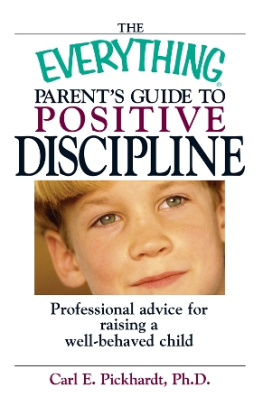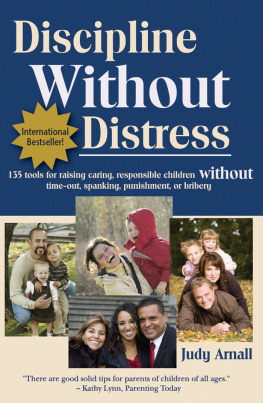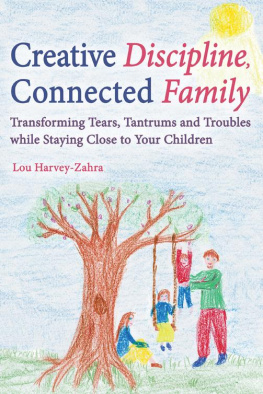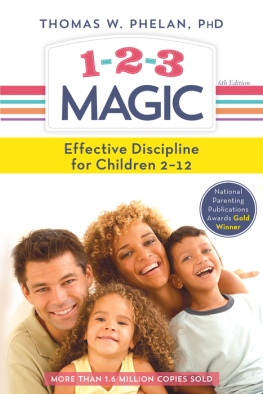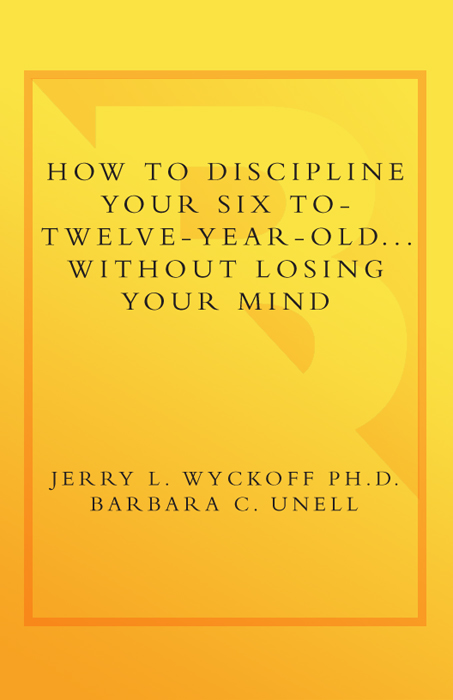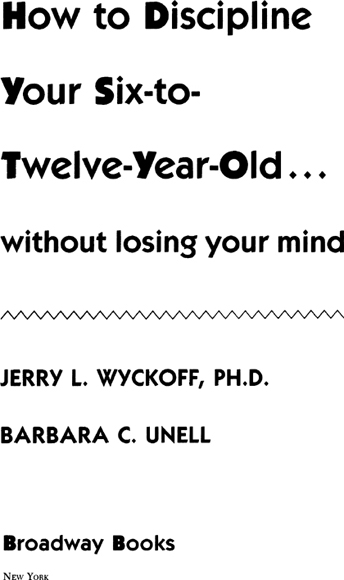All children present occasional discipline problems, no matter how understanding their parents are. Six-to-twelve-year-olds seem to have a different agenda from that of their parents as they experience the last stage of childhood and proceed through the half-child/half-adult world of adolescence, a stage that we call the middle years or childolescence. But parents can close the gap between themselves and their middle-years children by following the practical remedies offered in this book.
Our intent is to show parents how to react to the discipline problems of normal, healthy children in calm, consistent, and effective wayswithout imposing harsh punishments. We want to turn parents into disciplined parents who can control themselves when their children are least in control. We designed this book to be a handy reference for parents, a sort of first-aid book for handling inappropriate behavior. It recognizes the need parents have for brevity; for immediacy; and for direct, practical answers to parenting questions. The book offers advice on how to prevent inappropriate behavior from occurring and how to deal with such behavior when it does occur. There are also many example case histories here designed to illustrate how the strategies outlined in this book are applied to real problems.
This book was written out of the combined professional and parental experience of the authors. We have served collectively as teacher of developmental and child psychology; editor of parenting publications; and therapist in a school, hospital, and private practice, in addition to raising a total of four children. Our own experiences are supplemented by those of many other parents, who have contributed to this book.
Introduction
Some childhood authorities say that it is during infancy that the most care must be given to childrens hearts and souls. Others are no less zealous in espousing the importance of toddlerhood.
This book deals with a forgotten stage of child developmentthe childolescent years, ages six through twelve. We contend that these are the make it or break it years when parents can have a critical impact on their children, helping them develop a positive spirit and a curious attitude about their expanding world.
Childolescents seem to combine the best of all childhood worlds. They are as innocent, loving, curious, inventive, and independent as they were in the preschool years. They are also as self-sufficient, logical, and skillful in talking and listening as many adolescents. This seemingly wonderful combination can be volatile at times, however, and can often lead to the most intense of conflicts with parents.
These children are also faced with many expectationsat school and at homethat they are often hard pressed to meet. When they see failure as imminent, they then go to war with this world that is, in their view, making excessive demands on them. This war manifests itself through the childs inappropriate behavior at home, at school, and in the community. What children need is not a return declaration of war from parents in the form of greater demands and punishments. They need parental nurturing in the form of unconditional love, guidance, and support.
Parents will have to make rules and set boundaries even as they allow middle-years children to grow up and away. These boundaries need to be flexible and grow as a child grows, and children need to understand the reasons for them. Middle-years children can understand the reasoning of parents in making rules, even though they may not like the rules or the reasons. These children can also understand that there are consequences for following the rules and for breaking them. In fact, the best learning comes from making mistakes and accepting the consequences of doing so.
Still, childolescents often challenge the rules. Verbal challenging of this kind should not only be allowed, it should be encouraged. It is only through being allowed to state his position that a child can feel empowered and develop an understanding of his world and his role in it.
Therefore, in order to manage the childolescents behavior in a nurturing context, their parents must think of themselves as teachers because at their best, middle-years children are learners. When parents take a teaching approach to the management of childolescents, then their children have the opportunity to learn what they need to know in order to get along in the world.
But to be able to teach children in a way that they can best learn, teaching parents must first learn to discipline themselves. This self-discipline involves using understanding; tolerance; empathy; and above all, self-control, in coping with their offsprings inappropriate behavior. Parents who develop the self-control needed to become teaching parents are the best models that their children can have as they themselves learn to cope with a world that sometimes seems overwhelming.
This self-control needed to be teaching parents starts with self-acceptance. Parents must accept who they are in order to have unconditional love and acceptance of their children. This is the kind of acceptance that doesnt tell children that they must be someone else in order to be acceptable to their parents.



